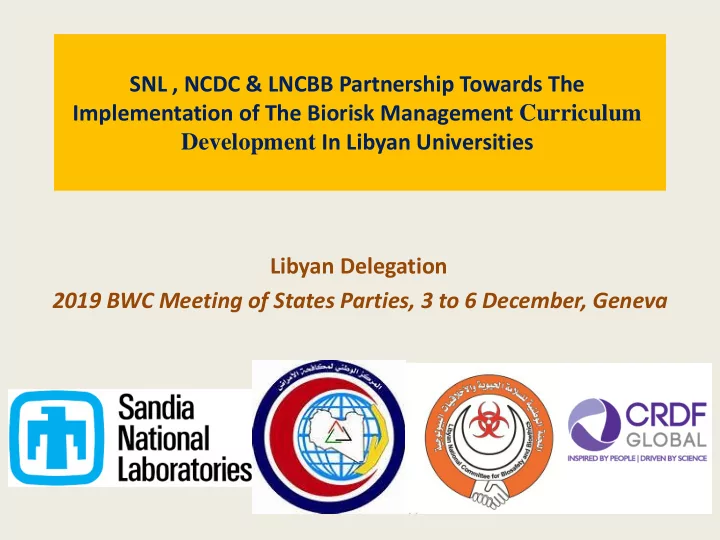

SNL , NCDC & LNCBB Partnership Towards The Implementation of The Biorisk Management Curriculum Development In Libyan Universities Libyan Delegation 2019 BWC Meeting of States Parties, 3 to 6 December, Geneva
Introduction Collaboration between the National Center for Disease Control, Libyan National Committee for Biosafety and Bioethics and Sandia National Laboratories has been established since many years to support implementation of Biorisk management program in Libya. The cooperation started with the MENA Twinning Program (MENA III) with a project on development of Biorisk Management Training Curriculum for Undergraduates at the Faculty of Medical Technology at the University of Tripoli.
The focus on undergraduate students allows a foundational implementation of BRM training targeting a specific group of individuals with potential biorisk vulnerability. Several comprehensive training events were conducted for academic teaching staff from Universities covered the whole country. This has lead to the implementation of BRM curriculum in a number of departments at Libyan Universities.
Partnership objectives This partnership will allow the development of a comprehensive training program for undergraduate students in Biorisk Management (BRM) on: 1- Implementation of Biorisk Management Curriculum at Libyan Universities 2- Development of BRM curriculum as foundation for implementation across the country 3- Provide trained professionals with skills, tools and confidence 4- Establish sustainable Biorisk Management Education
Component 1 : MENA-BRM twinning program The purpose of this program was to establish partnerships between Eastern and Western Biorisk Management Associates (BRMA), select and plan a BRM related project to work on over the following six months. The MENA III Participants would network on how they might develop strategic plans to accomplish SMART BRM goals. Each partnership would develop a project plan that addresses critical BRM needs at the Eastern twins facilities.
Project Title : Development of Biorisk Management Training Curriculum for Undergraduates at the Faculty of Medical Technology at the University of Tripoli
OBJECTIVES Develop a survey tool to Design a training curriculum evaluate need in this with focus on biosafety and population of medical biosecurity elements for an laboratory technologists undergraduate student population Develop an implementation plan for training skilled teaching staff to support the course roll-out
Rationale No such training program existed in Libyan universities, possibly even regionally or globally. The opportunity to implement a baseline foundation in BRM training to undergraduates at the University of Tripoli, will provide a resource- effective mechanism to implement BRM training program in Libya.
Component 2 : Development and implementation plan for training skilled staff members to support the course SNL Funded two main training workshops for active academics from five universities (University of Tripoli, Benghazi, Sebha, Misurata and Albeida). The training was held in Kuala Lumpur, Malysia in 2016, 2018. The purpose was to introduce BRM to adult learning; theory and techniques and to gain access to the Global Biorisk Management Curriculum (GBRMC), which is a free library of biorisk related training resources .
Component 3 : Libya Biorisk Management Curriculum Development Following up with Biorisk Management Training Programs, a workshop was held last June that was designed to empower university professionals with skills, tools, and confidence to integrate biorisk management topics and modules into existing curricula in their departments for the purpose of reducing risks associated with biological agents and toxins.
Component 4 : Current state of BRM curricula in Libyan Universities and Institutions University of Tripoli University of University of Albeida Sebha Undergraduate Undergraduate “ Elective Course ” : Undergraduate “ Elective Course ” : Faculty of Science course : Faculty of Faculty of Vet. Engineering and Postgraduate Medicine Technology, studies: Faculty of Postgraduate studies: Faculty of Science Pharmacy & Faculty and Faculty of Faculty of Vet. of Medicine Education Medicine Higher Institute for Forensic and University of Aljabal Algharbi Judicial research has adopted the Undergraduate Course course in their program Faculty of Science Departments: Botany, Zoology
Component 5: Libyan Universities Biorisk Management Network (LUBMN) In June 2019, Libyan University BRM Network was established with the following objectives : - Support BRM curriculum development implementation - Establish a link among universities that have already started to integrate BRM concept into academic curriculum to address Biosafety and biosecurity issues - Adopt One Health Approach and expand the current BRM Network to faculties such as veterinary medicine, medical technology, public health departments and agriculture
- Develop and use appropriate training/competence development programs and associated materials to understand, adopt and implement biorisk management strategies
- Create a community of knowledge sharing on biorisk management best practices by linking with other international institutions - Ensure implementation of safe and secure working environment to prevent accidental or deliberate release of infectious agents and protect university laboratory personal
Conclusion This was the first opportunity for the implementation of a training program in BRM in Libya, and the development of such curriculum will provide a foundation for implementing BRM across the country. This project would play an important role in implementing BRM in laboratories of health facilities, universities and research centers. The establishment of Libyan Universities BRM Network as consultancy body will support BRM curricula implementation and encourages other academia to join .
ACKNOWLEDGEMENT WE EXTEND OUR FULL GRATITUDE TO CRDF Glo lobal for THE SUPPORT WE RECEIVED to ATTEND THIS IS MEETING
Recommend
More recommend